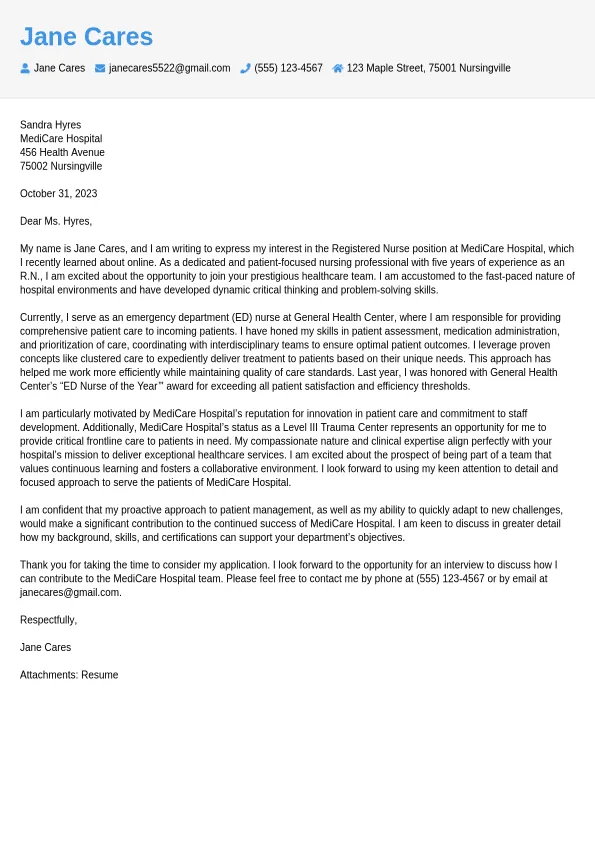Understanding the Nursing Cover Letter’s Importance
In the competitive field of nursing, a well-crafted cover letter is your initial opportunity to make a strong impression. It goes beyond simply listing your qualifications; it’s a chance to showcase your personality, passion for patient care, and suitability for the specific role and healthcare facility. A compelling cover letter can significantly increase your chances of securing an interview, making it a crucial element of your job application strategy. Think of it as your personal introduction, setting the stage for the more detailed information contained within your resume.
Key Components of a Nursing Cover Letter
A successful nursing cover letter comprises several essential components, each playing a vital role in conveying your qualifications and suitability for the position. These include a professional header with your contact information, a personalized greeting, a concise and engaging opening, detailed body paragraphs highlighting your skills and experience, and a strong closing statement. Each section needs to be carefully constructed to create a cohesive narrative that resonates with the hiring manager and effectively promotes your candidacy. Following these guidelines will ensure your application stands out.
Header and Contact Information
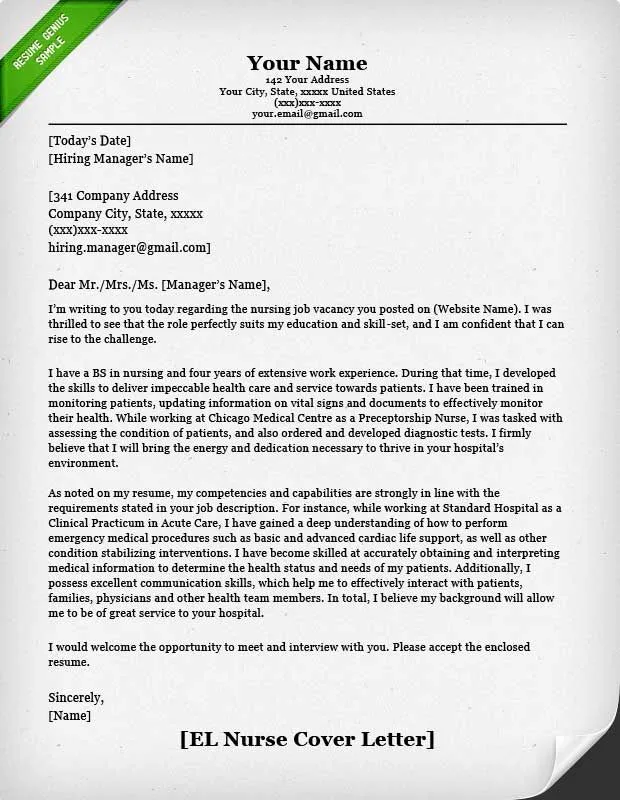
Your header should be at the very top of your cover letter and include your full name, phone number, email address, and LinkedIn profile URL (if you have one). Ensure this information is accurate and easily accessible. The header establishes your professionalism and provides the hiring manager with immediate contact details. Using a clear and readable font, like Arial or Times New Roman, ensures readability and a polished appearance.
Greeting and Addressing the Hiring Manager
Always address your cover letter to a specific person, if possible. Research the hiring manager’s name and title; this shows initiative and attention to detail. If you are unable to find a specific name, ‘Dear Hiring Manager’ is an acceptable alternative, though personalizing the greeting is always preferable. Avoid generic greetings that lack specificity. Using the correct salutation demonstrates respect and attention to the application process.
Highlighting Your Skills and Experience
This is where you demonstrate your value. Focus on your relevant skills, experience, and achievements. Use specific examples to illustrate your abilities and quantify your accomplishments whenever possible. Tailor your content to match the job description, emphasizing the skills and experiences that align with the employer’s needs. By demonstrating how your qualifications meet their needs, you make a stronger case for your candidacy.
Showcasing Relevant Nursing Skills
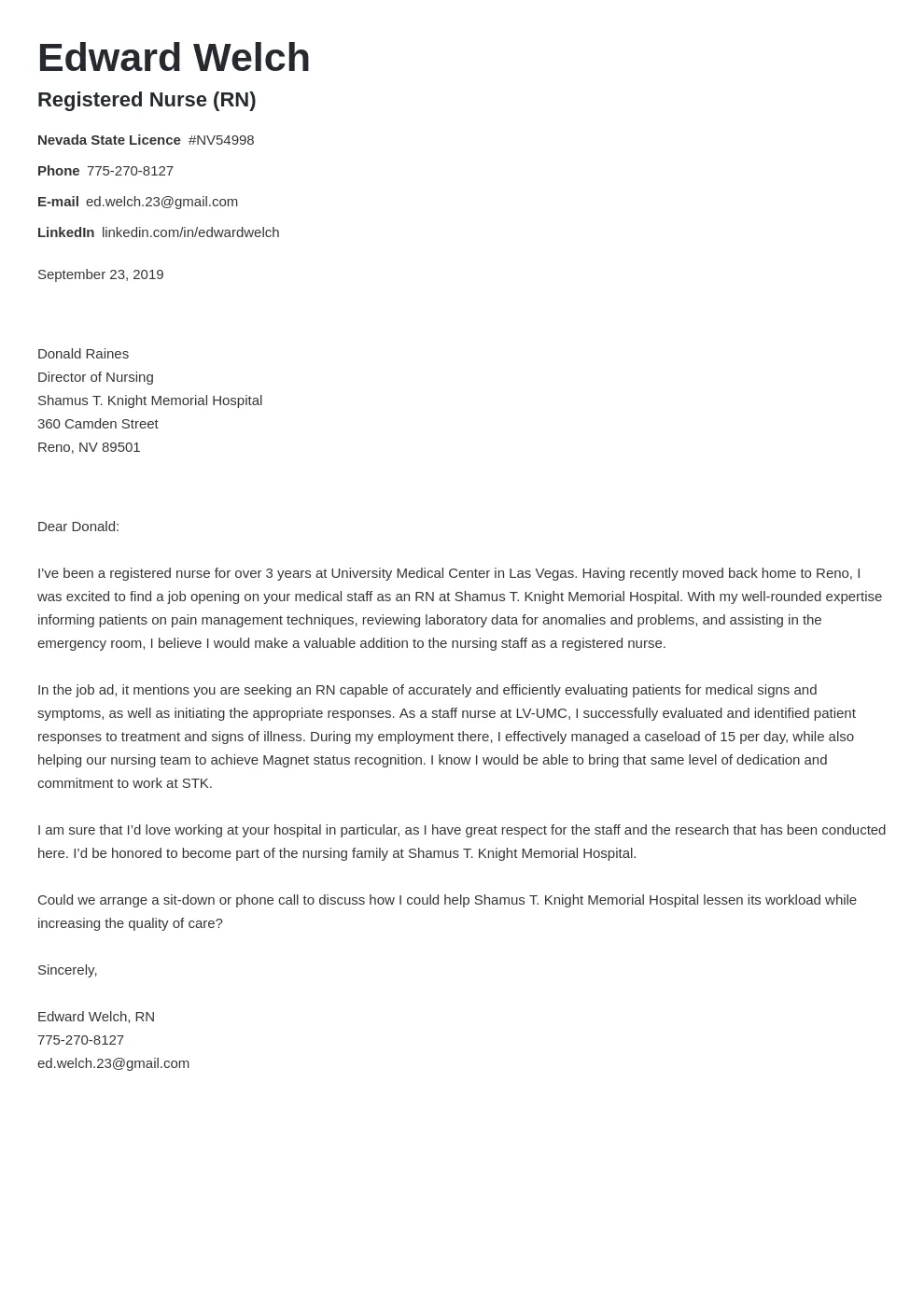
Nursing is multifaceted, so highlight skills relevant to the position. Include clinical skills (e.g., medication administration, wound care), technical skills (e.g., using electronic health records, operating medical equipment), and soft skills (e.g., communication, empathy, teamwork). Support these skills with specific examples from your past experiences. For example, mention successful implementation of a new patient care protocol.
Demonstrating Experience and Achievements
Go beyond listing your responsibilities; highlight significant achievements. Instead of saying ‘Managed patient care,’ state ‘Managed the care of 20+ patients daily, resulting in a 15% decrease in patient readmission rates.’ Use the STAR method (Situation, Task, Action, Result) to structure your examples. Quantify your accomplishments whenever possible using data and metrics to make your impact clear.
Tailoring Your Cover Letter to the Job Description
Every cover letter should be customized for the specific job. Carefully review the job description and identify the key requirements, skills, and qualifications sought by the employer. Then, align your cover letter to address these needs, using the same keywords and phrases found in the job posting. This shows that you’ve taken the time to understand the requirements and that you’re a good fit.
Researching the Healthcare Facility
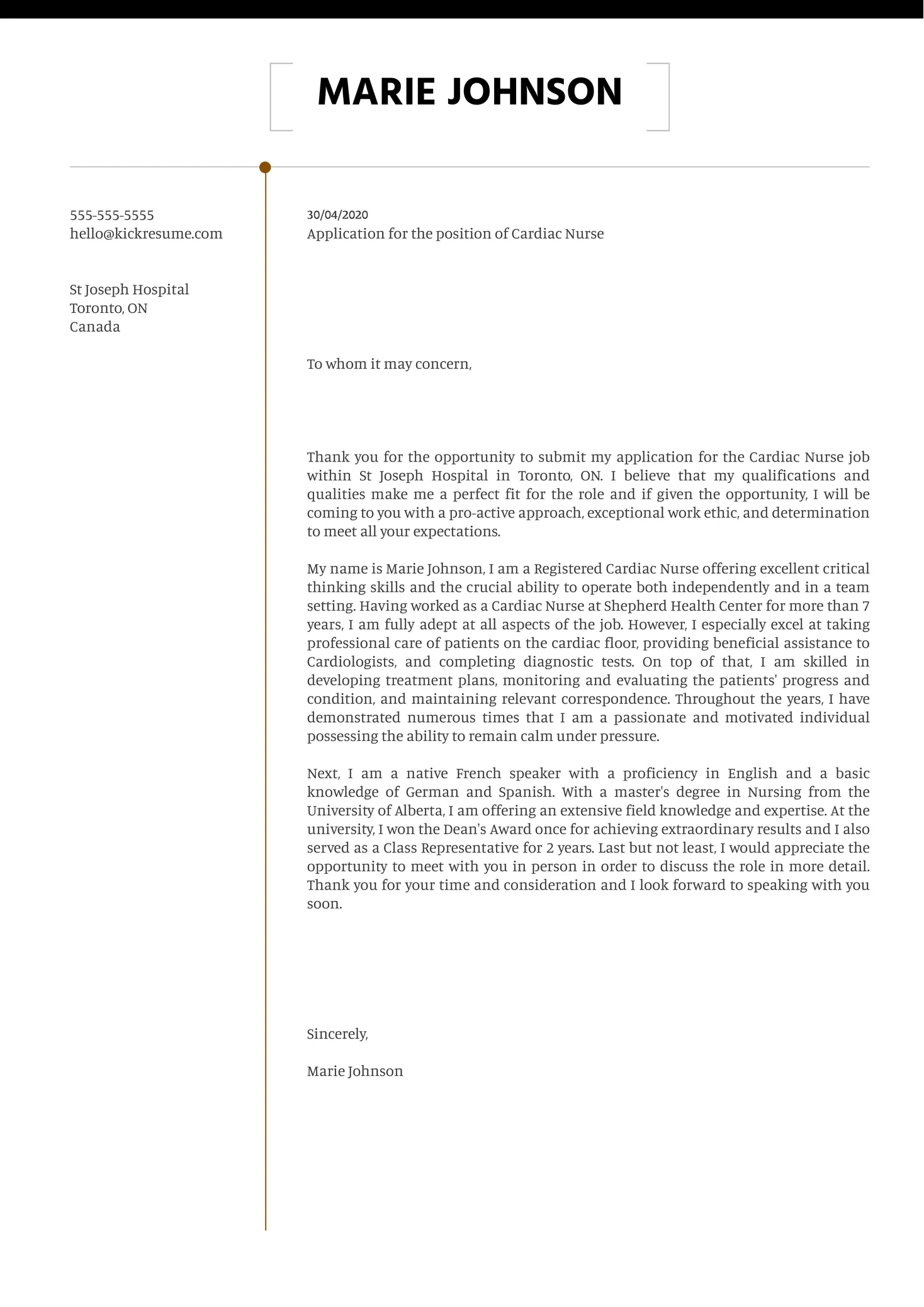
Demonstrate your interest in the position and the facility. Research the healthcare organization’s mission, values, and recent initiatives. Mentioning something specific about their work or culture shows that you have taken the time to understand their organization and that you’re genuinely interested in the opportunity. This personalized approach can help set you apart from other candidates.
Matching Skills to Requirements
In your cover letter, explicitly link your skills and experiences to the requirements listed in the job description. For example, if the posting mentions ’experience with electronic health records,’ highlight your proficiency with the specific EHR system used by the facility. This clear alignment reinforces your suitability for the role and makes it easy for the hiring manager to see you as a strong candidate.
Using Action Verbs Effectively
Start your sentences with strong action verbs to describe your accomplishments and responsibilities. Examples include ‘managed,’ ‘implemented,’ ‘coordinated,’ ‘improved,’ and ‘achieved.’ Action verbs create a dynamic and engaging narrative. Avoid passive language; use active voice to showcase your abilities and make your cover letter more impactful. This approach adds to the strength of your application.
Structuring Your Cover Letter for Impact
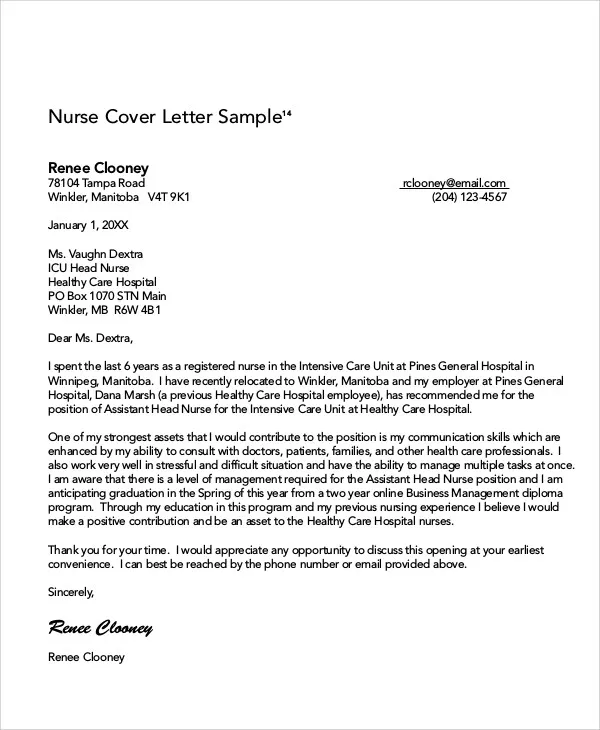
A well-structured cover letter is easy to read and understand. It should have a clear and logical flow, guiding the reader through your key qualifications and experiences. Ensure your letter is well-organized with an engaging opening, detailed body paragraphs, and a concise closing statement. This structure helps to ensure the message is easily understood and remembered.
The Opening Paragraph: Grabbing Attention
Start with a strong opening sentence that immediately captures the hiring manager’s attention. State your interest in the position and briefly mention a key qualification or achievement that makes you a strong candidate. Avoid generic opening statements. The opening should be concise and state the position you are applying for. This ensures the hiring manager knows your purpose immediately.
The Body Paragraphs: Detailing Your Value
The body paragraphs are where you elaborate on your skills, experience, and accomplishments. Use specific examples to demonstrate how you meet the requirements of the job. Focus on the most relevant information and tailor your content to highlight your strengths as they relate to the specific position. Each paragraph should provide a clear and concise argument supporting your qualifications.
The Closing Paragraph: Call to Action
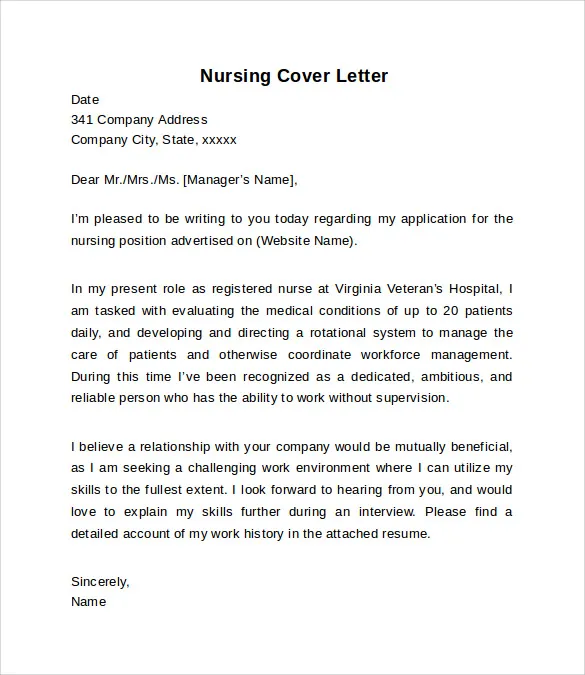
Conclude your cover letter with a strong call to action. Express your enthusiasm for the opportunity and reiterate your interest in an interview. Thank the hiring manager for their time and consideration. Provide your contact information again. This ensures that you leave a lasting positive impression and encourages the next step in the hiring process.
Proofreading and Editing Your Cover Letter
Thorough proofreading and editing are essential. Errors in grammar and spelling can undermine your credibility. Check for clarity, conciseness, and overall impact. Ask a friend or colleague to review your cover letter for a fresh perspective. Correct any mistakes and ensure a professional tone. A well-edited cover letter demonstrates attention to detail and professionalism.
Common Mistakes to Avoid
Avoid common mistakes, such as generic cover letters, typos, and excessive length. Don’t simply restate your resume; provide additional details and context. Avoid negative language or discussing reasons for leaving previous positions. Ensure your cover letter is concise and relevant to the job at hand, showing the hiring manager you are a great candidate. These details make the difference between getting an interview and getting passed over.
Formatting and Layout Best Practices
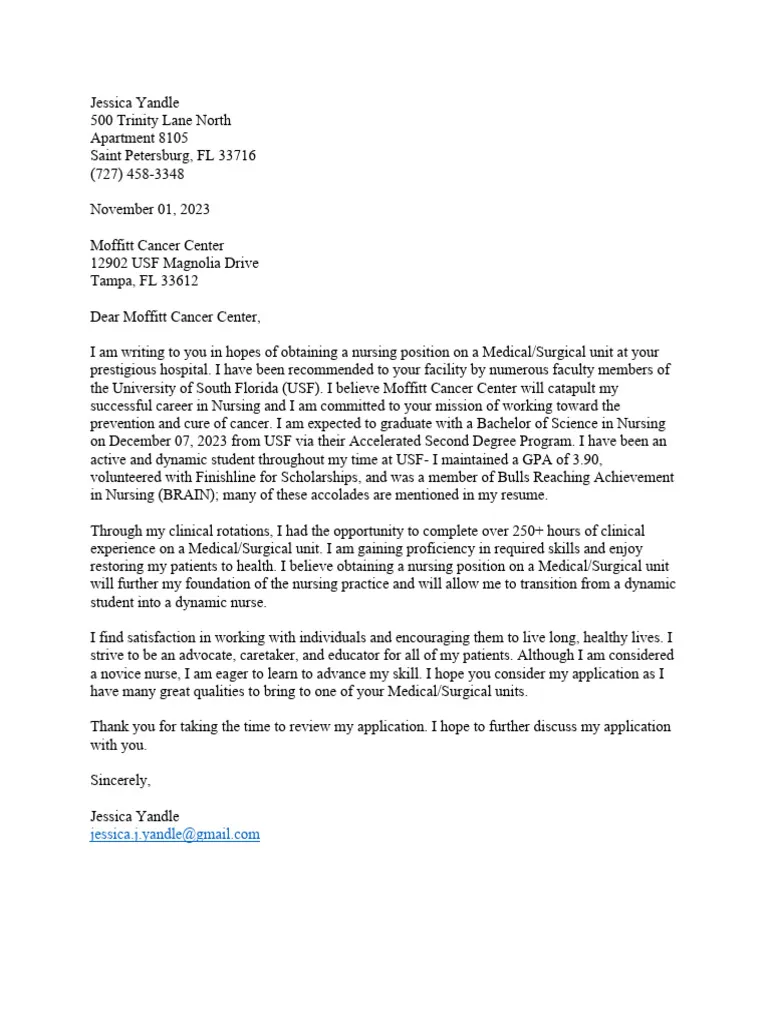
Use a professional font, such as Times New Roman or Arial, and maintain a consistent font size (11 or 12 points). Use single-spaced paragraphs with a space between each paragraph. Ensure that the letter is easy to read and visually appealing. Choose a clean, uncluttered layout. A well-formatted cover letter reflects your professionalism and attention to detail.
Using the Right Tone and Language
Use a professional and enthusiastic tone. Write in a clear, concise, and engaging style. Avoid jargon or overly casual language. Focus on showcasing your enthusiasm for nursing and your commitment to patient care. Your language should be appropriate for a formal application, making sure your personality shines through without being too informal.
Sample Nursing Cover Letters
Reviewing sample nursing cover letters can help you understand how to effectively present your qualifications. These samples provide examples of different formats, content, and writing styles. Analyze the structure, language, and overall impact of the samples to inform your own cover letter. Be sure to adapt them to fit your own experiences and the specific job you are applying for. This approach provides strong guidance.
Entry-Level Nursing Cover Letter Sample
An entry-level cover letter should emphasize your education, clinical rotations, and any relevant volunteer or extracurricular activities. Highlight your passion for nursing and your eagerness to learn and contribute. Focus on your soft skills and demonstrate your potential. Adapt sample letters to highlight these strengths effectively. This will help the hiring manager see your potential.
Experienced Nurse Cover Letter Sample
For experienced nurses, the cover letter should highlight your professional achievements, specialized skills, and leadership experience. Quantify your accomplishments with data and metrics whenever possible. Show how you have improved patient outcomes and contributed to the healthcare facility’s success. Adapt sample letters to emphasize your expertise. This helps highlight your experience and successes.
Specialty Nurse Cover Letter Sample
If you are applying for a specialty nursing position, such as ICU, ER, or operating room, your cover letter should focus on your expertise in that area. Highlight any certifications, advanced training, or specific skills relevant to the specialty. Use samples to adapt them to demonstrate your specialized knowledge and commitment to the specific field. Show the hiring manager that you possess the required credentials.
Cover Letter for a Nursing Leadership Position
For leadership roles, emphasize your management skills, experience, and leadership achievements. Highlight your ability to lead teams, improve clinical outcomes, and implement strategic initiatives. Include examples of how you have mentored staff or managed difficult situations. Tailor sample letters to showcase your leadership capabilities. This will prove your qualifications for the management role.
Adapting Samples for Different Roles
While samples provide valuable guidance, it’s crucial to adapt them to your specific situation. Modify the content to reflect your unique skills, experience, and the specific job requirements. Tailor the language to align with your personal style and the tone of the healthcare facility. Ensure that each sample is customized. This ensures that the hiring manager knows how your expertise fits the role.
Tips for Writing a Compelling Cover Letter
Several key strategies can help you write a compelling cover letter that stands out from the competition. These tips will guide you on key topics to emphasize during the application process. The points outlined below will help you make your cover letter shine.
Emphasizing Patient Care and Compassion
Nursing is centered on compassionate care. Highlight your empathy, communication skills, and dedication to providing the best possible patient experience. Share specific examples of how you have positively impacted patients’ lives. Emphasizing your patient care abilities demonstrates your commitment to patient-centered care. These actions add to your credibility.
Highlighting Professional Development
Showcase your commitment to continuous learning and professional development. Mention any certifications, advanced degrees, or relevant training you have completed. Discuss your involvement in professional organizations or conferences. Illustrate your desire to stay current with the latest advancements in nursing practice. This shows your dedication to the profession and the care it requires.
Quantifying Achievements with Data
Use data and metrics to quantify your achievements whenever possible. Instead of saying you ‘improved patient outcomes,’ state that you ‘reduced patient readmission rates by 10%’ or ‘increased patient satisfaction scores by 15%.’ Providing specific, measurable results strengthens your impact and credibility. Numbers make your impact more tangible and memorable.
Following Up on Your Application
After submitting your cover letter and resume, follow up with the hiring manager. Send a brief email or make a phone call to reiterate your interest and inquire about the status of your application. This shows your enthusiasm and initiative. Timing is important, so don’t be too persistent. A polite follow-up demonstrates your interest and professionalism.
